Being part of the UOC community is a much more powerful feeling than simply acknowledging a dedicated group of professionals, teachers and students who, by opening up virtual classrooms on a daily basis, have managed to forge one of the most successful experiences in e-learning in the world. It’s about adopting a whole new life style, one of continuous learning, and a new culture, wiki-culture and collaboration on the Net.
CONTENTS #07’2011
Editorial I am UOC / Imma Tubella
Dossier
I'M UOC.
15 YEARS The university with transformative power / Tomàs Delclós
Fifteen years of Uockie graduates / Àngels Doñate
Gabriel Ferraté. We wanted to break down the limitations of space and time / Gabriel Pernau
Journey to the heart of the UOC / Leo Ruffini
Trends in e-learning / Begoña Gros
Francesc Pedró. "Students are more conservative with the technology than we’d like them to be" / Ester Medico
The humanistic dimension of technology / Rosalind Williams
Walk the Talk Carl Holmberg. “We are a guarantee of education for all” / Lali Sandiumenge
Spotlight on Brenda Gourley. Swimming against the current / Jordi Rovira
Zoom In Eduard Punset. There is life before death
The conversation Imma Tubella in conversation with Josep Joan Moreso
WirelessThe Crossover University / Eric Hauck
MÓN UOC
At the student’s service / Arnau Cillero
Highlights
Interview / Francesc Serés. “Knowledge is public and should be debated and transformed” / Teresa Fèrriz
Degrees offered
UOC in numbers
Web / Web 2.0 a la UOC / Eva Asensio
Alumni
Community / Josep Coll. “We run the risk of dying of success”
Fifteen years of Uocki graduates / Àngels Doñate

David Campos
Thousands of students and graduates have found the Virtual Campus to be the place where they can continue studying, gaining knowledge that will help them professionally or simply for the pleasure of learning. Attending to them is a professional team of specialists and a methodology that is constantly evolving. Today their experiences seem quite normal, but fifteen years ago when the first UOC virtual classrooms opened, an e-mail or a website seemed straight out of science fiction. Nevertheless 206 students took up Educational Psychology or Business studies without hesitation. They were to be the precursors of a community of students, graduates, lecturers and associates which now consists of over 100,000 people in 87 countries.
“When at home the lights go out
and even the clothes drier is silent,
we class mates meet on the Virtual
Campus”
Gabriel Ferraté. “We wanted to break down the limitations of space and time” / Gabriel Pernau
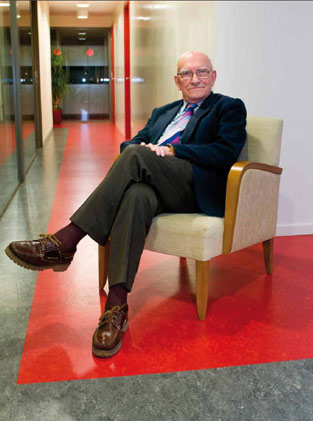
David Campos
It had to be a new university, different from the others. The UOC was the first university in the world to invent the idea of a virtual
campus. We wanted to break down the limitations of space and time through new technology. I had been President of the UPC for
twenty years. And I had learnt a lot there, including what not to do.
“The first meetings early in 1994
were secret, in the evenings and
at night, in my office or at home ”
“We created a different
university, adapted
to the changing times”
Brenda Gourley. Swimming against the current / Jordi Rovira
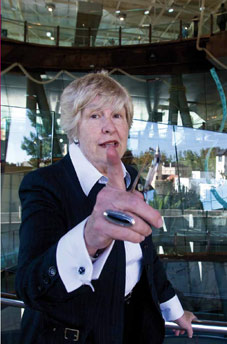
David Campos
Her words embody a determination which comes with experience. They are often accompanied with a smile and even a hearty laugh. Brenda Gourley (Johannesburg, 1943), former Vice-Chancellor of the Open University is a very approachable person with an extensive professional background which has made her into a reference point in open education. In this and other areas she often finds herself swimming against the current, something that President Imma Tubella pointed out on the occasion of her being awarded a UOC Honoris Causa on the 24th February.
From 2002 until 2009 she was
the first woman to head the Open
University
“If they don’t change, traditional
universities are in danger”
Imma tubella in conversation with Josep Joan Moreso
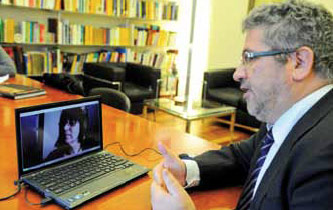
David Campos
Walk In: How would you define the status of higher education in
Catalonia?
Imma Tubella: I would make a distinction between the education
itself and the perception of it, and between what education is and
what the policies are. The first thing that comes to mind when I
think about higher education in Catalonia is that we’re doing fine,
but that we are clearly falling short of what we tried to do back with
the White Paper. The idea set forth there was to reflect and lay out
joint strategies rather than university-by-university strategies. We
have a solid university system with a wealth of possibilities, but we
have yet to address a major issue: cooperation.
“The Catalan university system
will be attractive to the world
if it acts in unison”
CONTENTS #06’2010
Editorial Old Europe needs e-migrants / Imma Tubella
Dossier And they’ll come... and we’ll still need them / Nicolás Castellano
Aristide Zolberg. "It is unethical to prevent entry into a country" / Gloria Zorrilla
Barça o Barçakh / Eric Hauck
Is asylum disappearing? / Javier de Lucas
Interconnected immigrants / Adela Ros
Cyberwarriors / Isabel Muntané
Mihaela Nedelcu. "ITCS contribute to integration" / Gabriel Pernau
Crisis, immigration and education / Dolores Juliano
Paper Bridges / Kim Amor
Grassroots tontines in moments of crisis / Papa Sow
Walk the Talk Sara Cobb. “Most peace agreements fail after five years” / Eva Millet
Spotlight on Esra'a Al Shafei. Empress 2.0 / Lali Sandiumenge
Zoom In The Cuban 'blogostroika' / Joan Antoni Guerrero
The conversation Fer in conversation with Ferreres. You can tell the truth in jest and lie with a straight face"
Wireless Iñaki Bustínduy. "You've got to make use dead time” / Albert Roca Enrich
MÓN UOC
New impetus for research / Leo Ruffini
Highlights
Interview / Jaume Roures “Catalonia has a powerful, cutting-edge audiovisual industry” / Joan Esculies i Serrat
Degrees offered
UOC in numbers
Web / www.debats.cat. The future of education, under debate / Josep M. Mominó
Alumni
Community / Josep Jorba. “Videogames are the most profitable entertainment sector” / Marta Catafal
And they’ll come ... and we’ll still need them / Nicolás Castellano
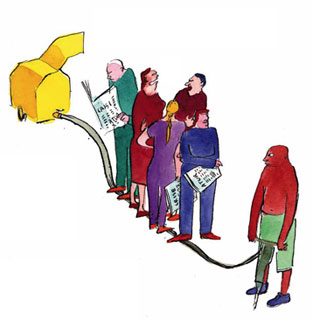
Joma
The opinion has taken hold that there are many or too many of them; that they logically have to return to their homelands in times of crisis. To people with a more radical bent, “they put the entire public health system at risk”. The large-scale police roundups to hunt down illegal immigrants seem normal, not to mention the cyclical, overblown controversies like the Islamic veil. The list of clichés that are hard to debunk is endless. Immigrants have once again become the scapegoat since the onset of the economy crisis in Spain and its wealthy counterparts.
The only thing lacking the right to
globalise is the freedom to emigrate
The quest for prosperity is the
oldest journey known to mankind
Aristide Zolberg. “It is unethical to prevent entry into a country” / Gloria Zorrilla
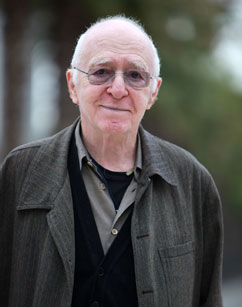
Joan Roca de Viñals
“Today in any democratic country we all have the right to leave, to abandon it, but not all of us have the right to enter. This makes no sense at all. In the name of what right do we hinder entry into a country? What right do people have to keep others outside their borders? In whose name? The fact is that it is totally unethical.”
“I’m a realist; I know that borders
can’t just be torn down suddenly,
but we can be more progressive”
“Americans are more open than
Europeans, perhaps because of
their own history as a country
of immigrants”
“Most peace agreements fail after five years” / Eva Millet
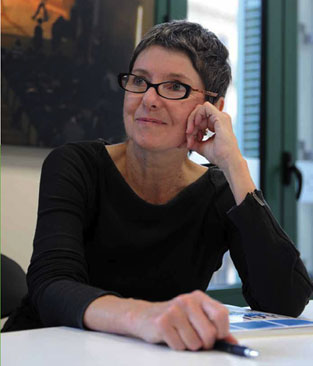
David Campos
Conflict resolution can’t be equated with diplomatic negotiation. It’s a discipline based on the most profound causes of dispute analysis. And it’s very clear about the fact that conflicts can’t be reduced to interests; it’s more complex than that. We understand that conflicts arise because of identity, culture, religion, history and relational dynamics. To a certain extent, many of the protagonists of a conflict don’t know what their interests are. Indeed, the majority of the most prolonged conflicts are those whose protagonists haven’t framed their perspectives in terms of their interests.
“Conflict resolution
isn’t a rational process”
“The United States
don’t understand that
the problem with Iran
isn’t about nuclear
weapons”
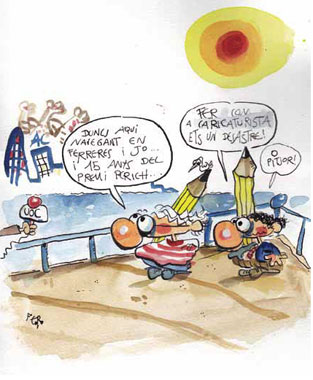
Fer
Fer in conversation with Ferreres
But we don’t always tell the truth, the whole truth and nothing but the truth. Not always, that’s true. You can also use drawings for demagoguery. All the dictatorships have had humorists; all you have to do is look at the newspapers from the USSR, Hitler’s Germany and Spain during the Franco regime. Humorists followed the party line; if not, they wouldn’t have survived. But we’re from the school of Perich, a brave illustrator, and that’s the joy of the illustrator.
“Politicians’ vanity and arrogance
turn them into prime raw material
for an illustrator”
CONTENTS #05’2010
Editorial The ‘arbre à palabres’ on the web / Imma Tubella
Dossier The second cold war /Carlos Enrique Bayo
Susan George. Alterglobalisation /Àlex Vicente
Countering terror with justice /Esteban Beltrán
Che Guevara’s grandchildren / Javier Otazu
Bruce Bimber. "Technology will not change politicians" / Jordi Rovira
Goals in question / Víctor M. Sánchez
New rights for new necessities / Jaume Saura
Gender, culture and human rights / Thoraya Ahmed Obaid
Satish Kumar. Ecocentrism / Gloria Zorrilla
Walk the Talk Sergi López. “The stereotype of sexy man is changing” / Anna Murgadas i Valldosera
Spotlight on François Dubet. Sociologist of exclusion / Núria Toril
Zoom In Gervasio Sánchez. “I speak for those who have no voice” / Lali Sandiumenge
The conversation Julià Minguillón speaks with Laura Czerniewicz
Wireless “Reglocalization” / Eric Hauck
MÓN UOC
The ebook is here to stay / Leo Ruffini
Highlights
Interview / Javier Zuloaga “We must learn to adapt to changes” / Ester Medico
Degrees offered
UOC in numbers
Web / Mosaic, Multimedia communication and technologies / Ferran Giménez
Alumni
Community/ Elena Cobler. “We can all choose not to use violence” / Albert Roca Enrich
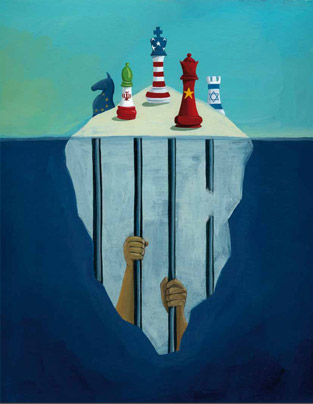
Carole Hénaff
The second cold war
Carlos Enrique Bayo
The world has been enmeshed in a second Cold War since the first year of the 21st century. This one is as merciless and destructive as the first one, but now it is multilateral. It does not pit two superpowers against each other, rather a myriad of minor powers are vying for the remains of the planet. Instead of a bilateral clash between the capitalist and communist blocs, we are now witnessing multiple conflicts and alliances with variable geometries, each of which depends on the specific economic and territorial interests in dispute.
We have arrived at this situation of global chaos precisely when we expected to achieve a “new world order”
In China there is a proliferation of “black jails” operating in secret
Satish Kumar. “Without spirituality there is no future” / Gloria Zorrilla
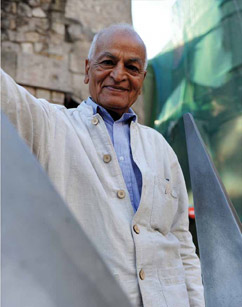
David Campos
“We have a very egocentric point of view. We think of nature in a utilitarian way: how it can be useful or serve mankind’s needs. If we shift from an egocentric point of view to one that is centred on the environment – ecocentrism – we would be taking a small yet major step for humanity.”
“Although it sounds paradoxical,
this is a ‘good’ crisis”
“The Europeans move with only
one foot, the Indians use both:
ecology and economy”
Sergi López “The stereotype of the sexyman is changing ” / Anna Murgadas i Valldosera
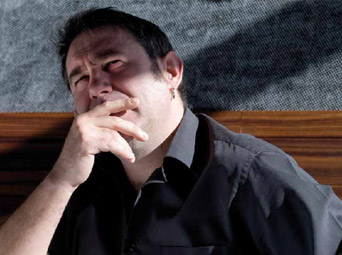
David Campos
Sergi López is one of the best-known Catalan actors in the world. He went to Paris to study theatre and came back to Spain as one of the icons of French auteur film. Regarded as one of the most appealing actors on the European scene, and an outspoken proponent of independence for Catalonia, besides cameras and sets he has now ventured into the restaurant business. When his calendar permits, you’re likely to find him at Negrefum, the restaurant he opened in Vilanova i la Geltrú (Barcelona), the city where he was born and lives.
“My father told me I’d end up as a street sweeper”
Julià Minguillón talks with Laura Czerniewicz
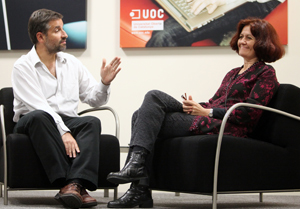
Joan Roca de Viñals
Mobile technology will be a useful learning tool, especially in Africa, where there is lower access to computers and broadband Internet. What do you think about this technology? I don’t know if I can say that, but I would say that it is the first technology that seems to be offering the promise of being genuinely ubiquitous. If you look at other technologies, there have always been serious divides. Do you know what percentage of the world’s population has a mobile phone? At the beginning of 2009 it was something like 63%. It is extraordinary.
“Mobiles are a way of reducing inequality”



